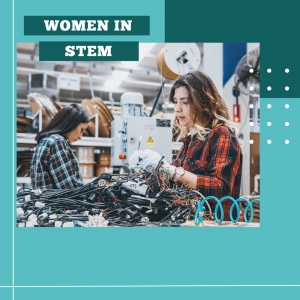Women In STEM
 Men have historically dominated STEM (Science, Technology, Engineering, and Mathematics) fields. However, over the past few decades, women have made significant strides in STEM, breaking barriers, and paving the way for future generations of women to excel in these fields.
Men have historically dominated STEM (Science, Technology, Engineering, and Mathematics) fields. However, over the past few decades, women have made significant strides in STEM, breaking barriers, and paving the way for future generations of women to excel in these fields.
According to WISE, as of the end of June 2022, the most recent government workforce statistics continue to demonstrate a rise in the proportion of women working in Core-STEM fields. Its number increased from 26.6% in December 2021 to 26.9% 2022.
Importance of Women in STEM
For a number of reasons, women need to be represented in STEM fields. Women bring different opinions and thoughts to the table that may inspire creative solutions to challenging issues.
A team that is diverse in terms of gender, colour, and background encourages innovation and encourages better decision-making. Young girls might be inspired to pursue jobs in STEM subjects by women who work in these industries as role models.
There are various key contributing factors to why there is gap in Women in STEM:
Gender Stereotypes: Teachers and parents sometimes undervalue girls' arithmetic skills beginning in preschool since STEM fields are typically seen as being masculine.
Male-Dominated Cultures: Since fewer women pursue STEM degrees and careers, these professions frequently maintain restrictive, and male-dominated cultures that are neither welcoming to or appealing to women and minorities.
Fewer Role Models: Because of the lack of female role models in books, media, and popular culture, girls are less likely to be inspired to pursue careers in science and engineering. Even fewer Black women serve as role models in the sciences and maths.
Math Anxiety: Lecturers, who are typically female, usually show mathematical anxiety that they pass on to the students. As a result, they often give girls lower grades for the identical assignments and presume that girls must study more to catch up to boys in math ability.
Challenges faced by Women in STEM
Despite the progress made by women in STEM, they still face significant challenges. One of the most significant challenges is the lack of representation. Women are still underrepresented in STEM fields, with only 24% of STEM jobs held by women in the United States. This lack of representation can lead to feelings of isolation and make it challenging to find mentors and allies.
Another challenge is the unconscious bias that women face. Research has shown that people often hold unconscious biases that can affect their perceptions and decisions regarding women in STEM fields. These biases can lead to women being overlooked for opportunities and promotions.
Finally, women in STEM fields often face a work-life balance challenge. STEM fields often require long hours and inflexible schedules, which can be difficult for women who want to balance their careers with their personal lives.
Initiatives to encourage women in STEM
To address the challenges faced by women in STEM, several initiatives have been taken to encourage more women to pursue careers in these fields. One of the most significant initiatives is the creation of mentorship programs that pair women with successful women in their fields. These programs provide guidance, support, and advice, helping women overcome the challenges they face.
Another initiative is the promotion of STEM education among girls from an early age. Programs such as Girls Who Code and the National Girls Collaborative Project encourage girls to develop an interest in STEM fields through workshops, camps, and other activities.
Conclusion
Women in STEM fields have made significant progress over the past few decades, but there is still a long way to go. It is essential to continue promoting diversity and inclusivity in STEM fields to create a workforce that is representative of society as a whole. By addressing the challenges faced by women in STEM fields and providing support and encouragement, we can inspire the next generation of women to excel in these fields and continue breaking down barriers.



